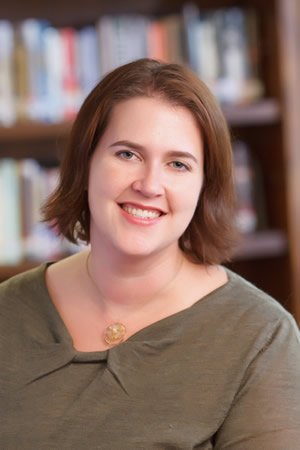Dr. Angie HillikerBy Ha An Nguyen Posted: December 9, 2019  Dr. Hilliker is an Associate Professor of Biology at the University of Richmond (UR) in Richmond, Virginia. After receiving her undergraduate degree from Oberlin College, she earned her Ph.D. from the University of Chicago, where she studied the role of the small nuclear RNAs U2 and U6 in activating and remodeling the spliceosome in Dr. Jon Staley’s laboratory. She then moved on to the University of Arizona to work on the DEAD-box protein Ded1 with Dr. Roy Parker as a Leukemia and Lymphoma Postdoctoral Fellow.
Dr. Hilliker’s post-doctoral work shaped her scientific direction when she found that S. cerevisiae Ded1 assembles and remodels the eIF4F-mRNA complex in translation initiation. Ded1 continues to fascinate her because it participates in a diverse array of functions throughout the many steps in the lifecycle of mRNA. The current emphasis of her laboratory at UR is understanding how the RNA helicase Ded1 is regulated. She is curious to see how Ded1 can participate in all these wide-ranging interactions, and she suspects that “looking at its regulation such as post-translational modifications will be key to understanding its seemingly diverse roles.”
UR is a predominantly undergraduate institution, and Dr. Hilliker finds “It is exciting and invigorating to work with new scientists. They are enthusiastic about everything that they get to try, because it’s all new.” She also feels it’s deeply rewarding to invest time into teaching and mentoring. Teaching has encouraged her to explore “unusual and riskier topics.” For instance, her beer brewing class has led to a side project in the lab where they are trying to “find DNA signatures of yeast used to make 200 year-old wine from the collection of the John Marshall House, a museum here in Richmond.”
At the same time, she found that “as a faculty member at a primarily undergraduate institution, you do a lot of things that aren’t part of your training as a graduate student or post-doc. You have to mentor, teach effectively, budget, etc. I do most of the training in my lab and still run some of my own experiments, while overseeing all of the student projects. At a small school, you are your own lab manager and technician most of the time. So, I may be defrosting the freezer or fixing equipment.” She continued, “I’m also a cheerleader for my students, who are high achievers and often new to the high failure rate that bench science brings.”
For current trainees, Dr. Hilliker likes to use a musical analogy: “a musician prepares for a concert through diligent group rehearsal and individual practice. If you pay attention during rehearsal, even when the conductor isn’t addressing your group, even when you aren’t playing, you still learn about the music that you are part of making.” In her eyes, training in science is just the same. “Every day in graduate school and as a post-doc is like a practice rehearsal leading up to your ultimate career,” she explained. “Your training period is the time to hone your craft. What qualities do you want as a future scientist? If you want to be connected with the scientific community, pay attention to those around you in your lab, your program, and at conferences. If you want to be a public voice for science, then start getting active on twitter and pay attention to what people blog about. The habits you build now, day by day, are the ones that will make you a better scientist and thinker down the road.”
Her other piece of advice came from Dr. Staley, one of her mentors. “Think about ‘class A versus class B’ experiments,” she said. “Class B experiments give you either an interesting, interpretable result or a negative result that can be hard to interpret. Class A experiments are where any answer you get reveals something new. It’s not always to come up with a class A experiment for a particular question, but this always makes me try to come up with the most fruitful approach to a question.”
Dr. Hilliker has been a long-time member of the RNA Society, and “this vibrant and generous scientific community” has been an integral part of Dr. Hilliker’s career. Her first solo poster and first oral presentation were both at RNA Society meetings. She has many fond memories at meetings over the years, including the “excitement in the air” at the early talks on CRISPR and “watching a bunch of scientists in black tie waltzing in Vienna.”
Dr. Hilliker thinks that riboswitches are “super interesting” even though she doesn’t work on them. You can find her on Twitter (@angiehilliker) or on Instagram (@akhilliker), where you can keep up with her hobbies such as playing the flute, ceramics, and baking. The writer of the piece was an undergraduate at UR and can attest to Dr. Hilliker’s genuine and infectious excitement for teaching and mentoring, as well as science. |
